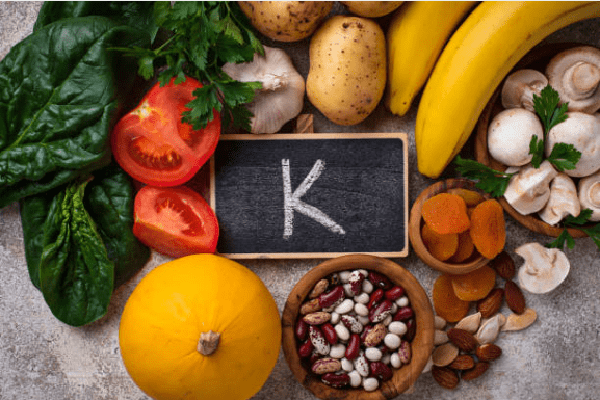Endocrinology >>>> Hypokalemia
Hypokalemia.

Hypokalemia is a condition of the body when the concentration of potassium ions in the blood plasma is significantly reduced. There are a number of factors contributing to the development of hypokalemia, which can be divided into groups:
- Disorders of intercellular movement and redistribution of potassium ions;
- Functional disorders of the system for removing potassium from the body;
- Insufficient intake of potassium from food.
The redistribution of potassium ions between cells and its movement from the extracellular fluid into the cell is regulated by insulin and catecholamines, thyroid hormones. With an overdose of insulin (or infusion therapy using glucose solutions), hyperglycemia, the content of potassium ions in the blood serum decreases, forcing it to move into the cell. Catecholamines (neurotransmitters - norepinephrine, adrenaline, dopamine), released into the bloodstream during stress, increase the activity of the cell membrane, which, in turn, is influenced by thyroid hormones (or rather, their hypersecretion in hyperthyroidism). Under the influence of these factors, potassium ions move from the intercellular fluid into the intracellular space, resulting in a drop in the level of potassium in the intercellular fluid.
Some drugs also affect the redistribution of potassium. In particular, beta2-adrenergic agonists reduce the concentration of potassium in the blood, on the other hand, beta-blockers can cause blockade of beta-adrenergic receptors and thereby increase the concentration of potassium in the blood and in the extracellular fluid. Improper redistribution of potassium between the extracellular and intracellular environment leads to a decrease in the excitability of nerve and muscle fibers.
The loss of potassium during its excretion from the body also determines the causes of hypokalemia. One of the reasons may be the loss of potassium through the gastrointestinal tract in diseases of the gastrointestinal tract associated with impaired absorption of potassium; with anorexia; with diarrhea; when using laxatives. In these cases, the factor of potassium loss is the developing alkalosis, which promotes the excretion (excretion) of potassium through the kidneys. The second reason for the loss of potassium into the environment may be increased potassium excretion with diuretic abuse, with tubular acidosis (both types), with interstitial nephritis, with Gitelman's syndrome, with hyperaldostironism. In addition, increased sweating can lead to hypokalemia.
Rarely encountered causes of hypokalemia include a number of diseases: Bartter's syndrome, geophagy, villous polyp, hereditary hypokalemic muscle paralysis.
A lack of potassium from food can cause hypokalemia only in cases where a person adheres to a diet that excludes potassium-containing foods, is malnourished due to a low standard of living or because of a rash diet (especially in the elderly).
Signs of hypokalemia manifest in different ways and depend on the severity of the disease (that is, the level of decrease in potassium concentration). Usually, the state of health is impaired when the potassium level is less than 3 mmol / liter.
The characteristic signs of hypokalemia are:
- myalgia,
- weakness in the muscles of the limbs,
- cramps in the muscles of the limbs,
- numbness (loss of sensation) of muscle tissue,
- paresis and / or paralysis,
- increased fatigue,
- violation of respiratory functions.
With hypokalemia, the following may develop:
- intestinal obstruction,
- cramps in the gastrointestinal tract,
- rhabdomyliosis,
- arrhythmias,
- hypertonic disease,
- diabetes insipidus (nephrogenic).
When diagnosing hypokalemia, they rely on data from a patient survey about his diet, lifestyle, and medications used (especially laxatives and diuretics, including herbal diuretics, which may be included in tea or tinctures used by the patient). They conduct a blood test for trace elements, a urine test to detect renal dysfunction. A set of diseases in the anamnesis is determined, which may affect the metabolism of potassium.
Treatment for hypokalemia depends on the underlying cause:
- Insufficient intake of potassium from food is compensated by the intake of potassium-containing preparations (vitamin and mineral complexes, Asparkam, Panangin), a revision of the diet or diet in the direction of increasing the consumption of foods rich in potassium (especially green vegetables: lettuce, salad types of cabbage, spinach, etc.).
- In metabolic alkalosis, as the cause of hypokalemia, potassium chloride is prescribed.
- For renal acidosis, diarrhea, potassium citrate (or potassium bicarbonate) is used.
- In severe cases of hypokalemia (as well as in congenital hypokalemic paralysis), intravenous administration of potassium preparations is used under the supervision of an electrocardiogram and the patient's motor functions.
What is the danger of a lack of potassium in the body? Since the targets of hypokalemia are the cells of muscle and nervous tissue, a violation of their functions towards a decrease in excitability and impaired signal transmission leads to an imbalance in the work of the myocardium, which is reflected in a violation of the pathways of impulse conduction to the heart muscle, on a change in the automatism of its work, provoking arrhythmias, and a decrease in myocardial contractility. Severe cases of hypokalemia can lead to paralysis of the intercostal and diaphragmatic muscles, impaired breathing, up to its hardware support.

Read

Read



























